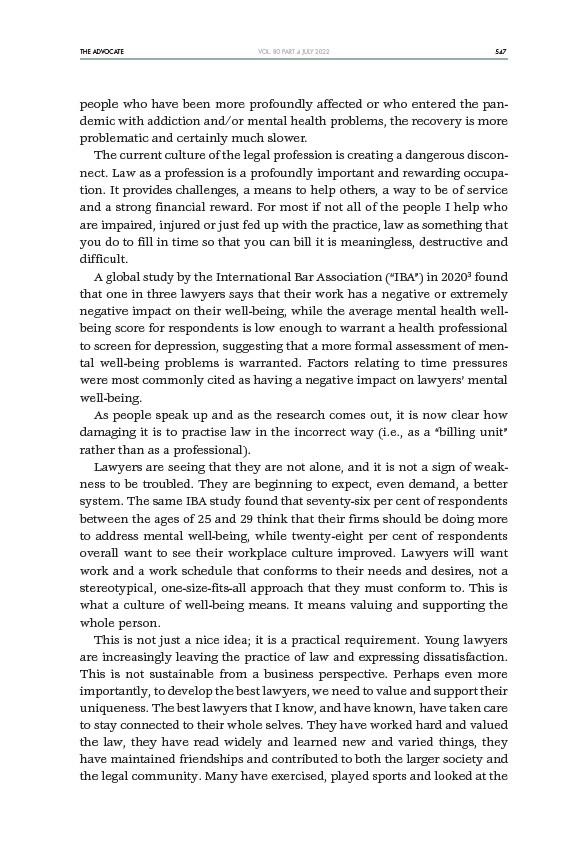
THE ADVOCATE 547
VOL. 80 PART 4 JULY 2022
people who have been more profoundly affected or who entered the pandemic
with addiction and/or mental health problems, the recovery is more
problematic and certainly much slower.
The current culture of the legal profession is creating a dangerous disconnect.
Law as a profession is a profoundly important and rewarding occupation.
It provides challenges, a means to help others, a way to be of service
and a strong financial reward. For most if not all of the people I help who
are impaired, injured or just fed up with the practice, law as something that
you do to fill in time so that you can bill it is meaningless, destructive and
difficult.
A global study by the International Bar Association (“IBA”) in 20203 found
that one in three lawyers says that their work has a negative or extremely
negative impact on their well-being, while the average mental health wellbeing
score for respondents is low enough to warrant a health professional
to screen for depression, suggesting that a more formal assessment of mental
well-being problems is warranted. Factors relating to time pressures
were most commonly cited as having a negative impact on lawyers’ mental
well-being.
As people speak up and as the research comes out, it is now clear how
damaging it is to practise law in the incorrect way (i.e., as a “billing unit”
rather than as a professional).
Lawyers are seeing that they are not alone, and it is not a sign of weakness
to be troubled. They are beginning to expect, even demand, a better
system. The same IBA study found that seventy-six per cent of respondents
between the ages of 25 and 29 think that their firms should be doing more
to address mental well-being, while twenty-eight per cent of respondents
overall want to see their workplace culture improved. Lawyers will want
work and a work schedule that conforms to their needs and desires, not a
stereotypical, one-size-fits-all approach that they must conform to. This is
what a culture of well-being means. It means valuing and supporting the
whole person.
This is not just a nice idea; it is a practical requirement. Young lawyers
are increasingly leaving the practice of law and expressing dissatisfaction.
This is not sustainable from a business perspective. Perhaps even more
importantly, to develop the best lawyers, we need to value and support their
uniqueness. The best lawyers that I know, and have known, have taken care
to stay connected to their whole selves. They have worked hard and valued
the law, they have read widely and learned new and varied things, they
have maintained friendships and contributed to both the larger society and
the legal community. Many have exercised, played sports and looked at the